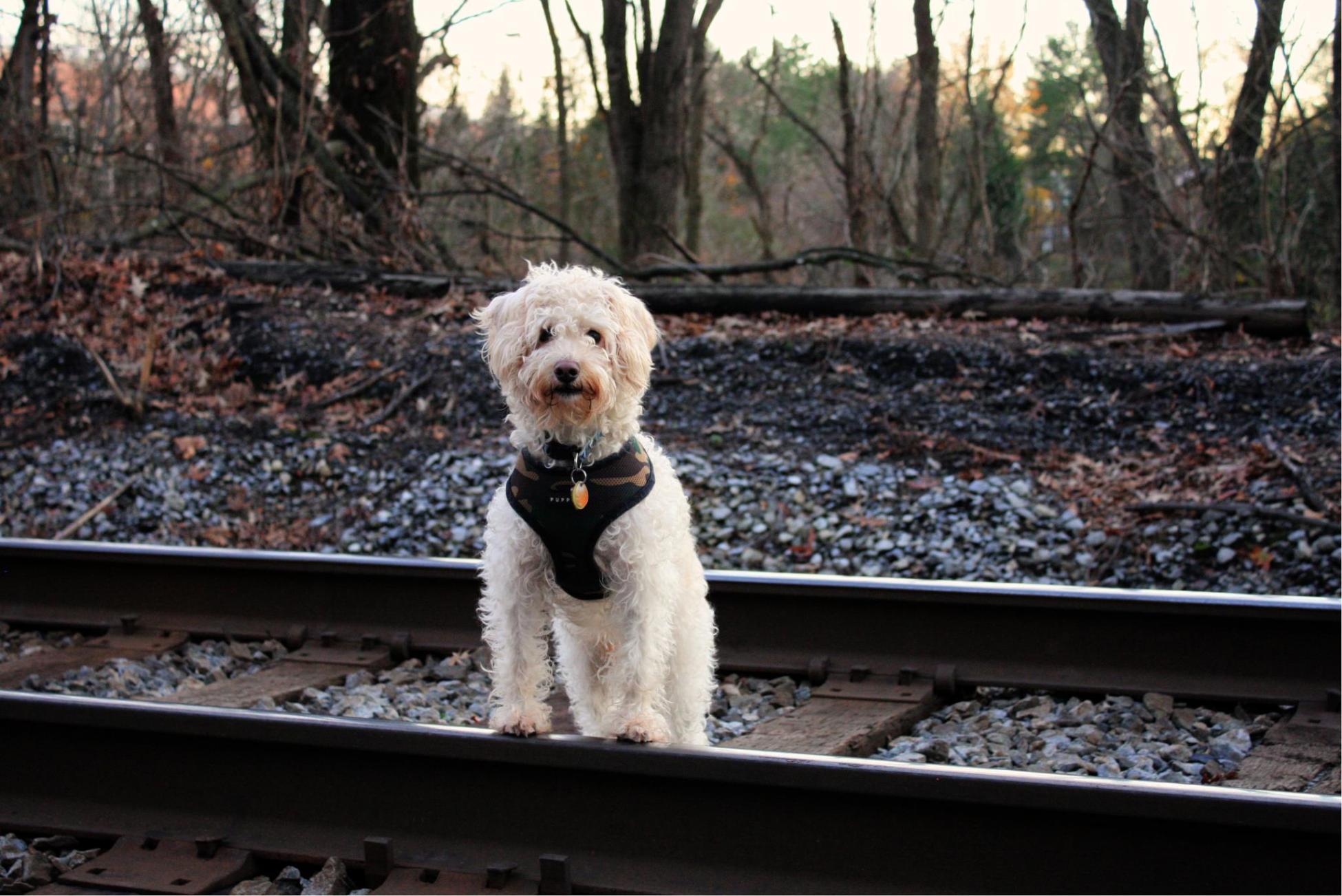Louie was a Baltimore success story. After a rough start in life, he went on to become a world traveller. He did what many Baltimoreans can’t say: He made it out of the city.
I met Louie, a poodle-schnauzer mix, one fateful day in 2010 at the Baltimore animal shelter. At 10 months old, he had already been discarded and found himself inside a pen with a concrete floor, surrounded by the desperate howls of similarly forsaken dogs. When I saw him, I knew he was the one for me.
His early years were full of activity: weekend trips to rural West Virginia; hikes and camping in western Maryland; and summer barbecues on South Baltimore patios. But his ultimate adventure came when he boarded a plane with me to start a new life in Dublin, Ireland in May 2017. With its seemingly endless green landscapes, there was much to explore that first year.
We weren’t long for Ireland, though. I met my boyfriend, Juan, in Madrid at the end of May. A few weeks later, Juan came to visit me in Dublin. Opening his suitcase in my apartment, he pulled out a bottle of wine for me and a toy and treats for Louie. My dog loved this new guy bearing gifts and belly rubs.
Adjusting to a new world
By August 1st, we were living in Madrid. The first month was a challenging adjustment. Louie barked at every noise, often waking us up at night. The dry, dusty streets meant his white fur had a constant brown tinge. Most of all, sharing my attention with my boyfriend set him on edge. His mood and behaviour changed slightly, but I chalked it up to a settling in period.
My dog's behaviour changed, but I chalked it up to a settling in period. It wasn’t until the beginning of September that I noticed something was seriously wrong.
It wasn’t until the beginning of September that I noticed something was seriously wrong. After returning home from our usual Sunday night dinner, Louie met us at the door looking very sick. Thinking it might be an upset stomach, I put him in bed with us. Shortly after, he threw up twice. Feeling extremely uneasy about the situation, I hailed at cab at 4:30 am to the 24-hour emergency vet.
Once we arrived, I found the veterinarian spoke no English so I fumbled through my description of his symptoms. I felt desperate, like I was leaving out key details just because I didn’t know how to say them. She gave him two injections for nausea and pain and sent us home. Five hours later, he seemed no better, so we walked to the neighbourhood vet. Once again, he was given an injection for nausea. I was told to bring him back if he threw up after eating.
Still unable to hold his food down, we were waiting outside the office when it reopened that evening. The vet took an x-ray and concerned by the imaging, performed an ultrasound. By chance, she passed the wand near his heart and stopped short.
“I need to talk to your boyfriend,” she said to me in Spanish. Calling Juan at work, I passed the phone to her. Picking up bits and pieces of the conversation, I heard the following: very serious, liquid around the heart, get here soon.
Juan appeared within minutes and explained to me that we needed to go to the emergency veterinary clinic immediately as a drain was needed to remove a dangerous amount of fluid in the pericardium around Louie’s heart. Once there, Juan spoke with the vet, while I stood by helpless. We were told they would perform the procedure right away and would call when it was complete.
Seeking support in a second language
Later that evening, we were told the drain was successful and that I could visit him the next afternoon. I went on my own while Juan was at work and was overjoyed to see how improved he was. I stumbled through my Spanish as we arranged follow-up appointments, which I would also need to navigate alone.
The next two days, I consulted my Spanish dictionary app obsessively and took notes on what I wanted to say. I researched his condition and found medical journal articles in Spanish. No one had come right out and told me what was wrong, but I put the pieces together myself. When I showed an article to the vet she confirmed my worst fears: cardiac hemangiosarcoma. Heart cancer with a very poor outlook. Reassuring me through my tears, she told me he was doing well despite the circumstances. He was muy fuerte (very strong).
On Thursday, I reluctantly had to leave for Dublin to sort out my visa. A friend took Louie to a cardiologist appointment on Friday, and after Juan got off work at 6pm, he sent me a selfie of the two of them.
Less than two hours later, he called me, panicked and crying. Louie had just passed away. Sitting on my hostel bed in Dublin, I broke into wailing tears. I wasn’t there with him and he would never understand why.
Wrapping him in his blanket, Juan took him to the emergency clinic. He later told me the staff cried at the news. They kept him for me so I could say a proper goodbye. The next night, Juan met me at the airport and we went straight to the clinic. Laid out on an exam table, Louie looked like he was sleeping.
Losing my beloved pet was hard but losing him in a foreign country was even harder. Despite Juan’s help, I felt helpless most of the time. But I learned a lot, too. Although the language barrier caused me stress and anxiety, it forced me to overcome my fear of speaking to communicate with the veterinarians. I was reminded of the universality of human kindness. All the vets I dealt with were extremely compassionate and genuinely engaged in Louie’s care. While it was a horrible situation, I was made to feel like both my dog and I mattered. I couldn’t have asked for a better experience given the circumstances.
Living abroad is not always flawless, but if you look, you can find rays of sunshine in even your darkest moments.
Add this article to your reading list




